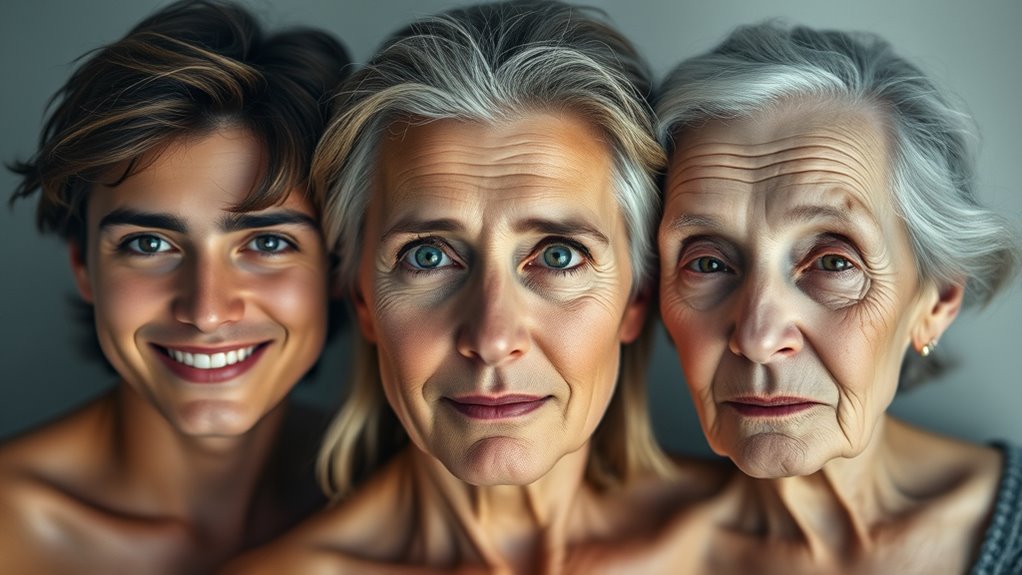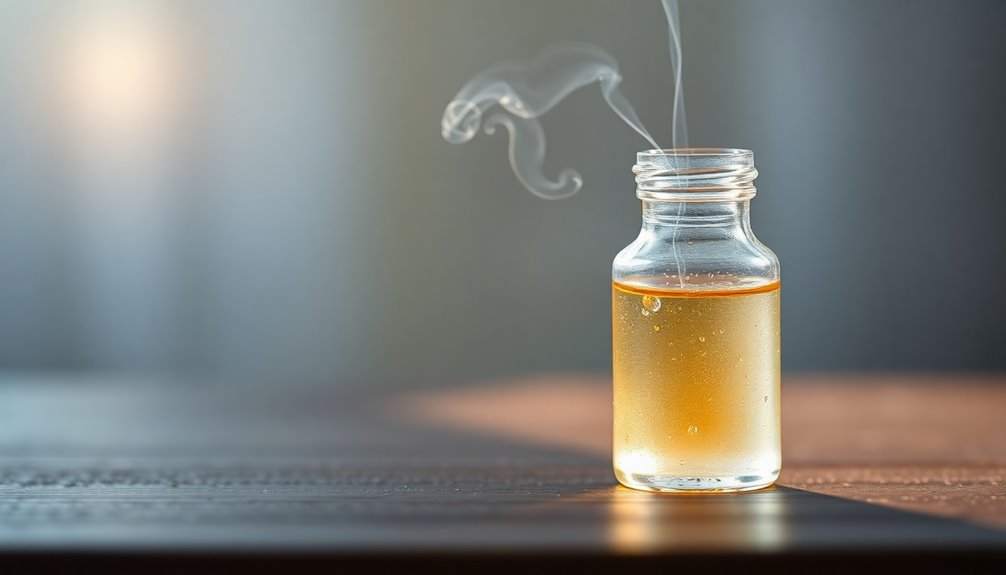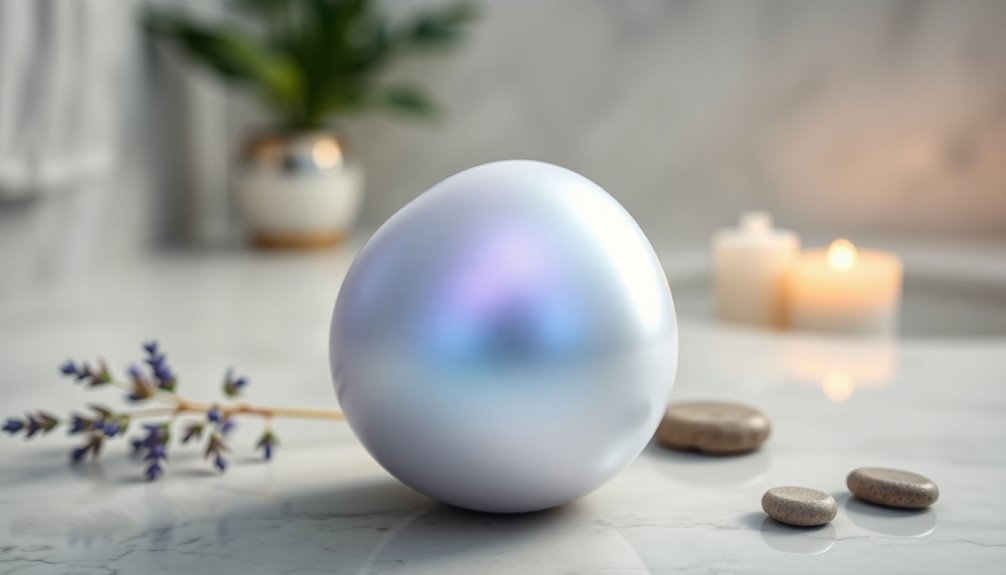Your libido changes throughout life, starting with minimal desire in childhood and early adolescence when hormones are low. In early adulthood, it rises as confidence and hormones like testosterone increase, making desire vibrant. During middle age, fluctuations and lifestyle factors can lower libido, while aging often causes declines due to health and hormone levels. If you keep exploring, you’ll uncover ways to support a healthy sexual life at any stage.
Key Takeaways
- Libido is minimal during childhood and early adolescence, with hormonal activity gradually increasing during puberty.
- Early adulthood features a peak in sexual desire driven by hormonal levels like testosterone and increased confidence.
- Middle age involves hormonal fluctuations and lifestyle factors that can cause libido to decline or become unpredictable.
- Aging and health issues such as chronic illnesses and medications often lead to decreased sexual desire in senior years.
- Lifestyle habits like exercise, stress management, and open communication can help maintain a healthy libido throughout life.
Libido During Childhood and Adolescence
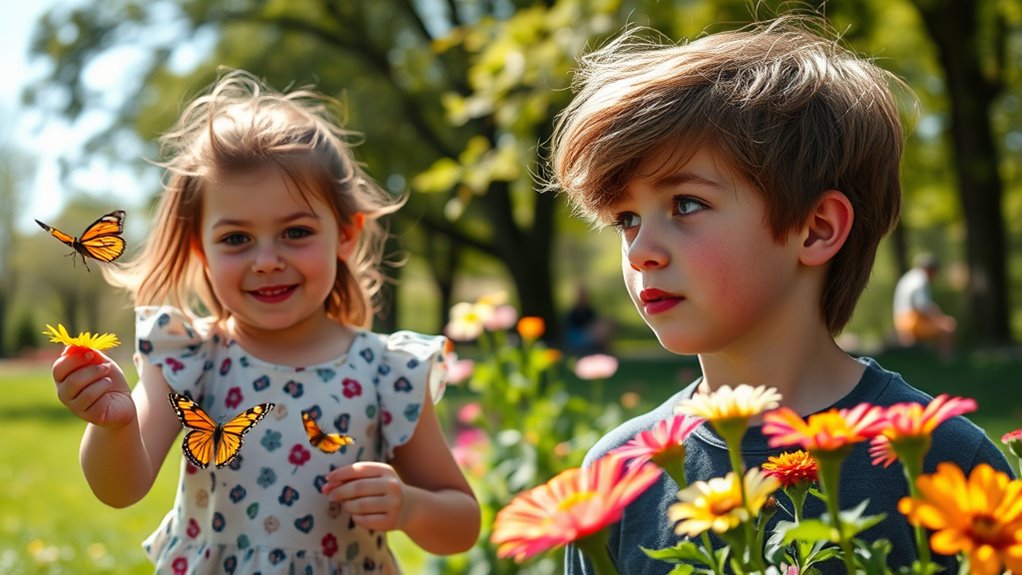
During childhood and adolescence, libido is generally minimal or absent, as these stages focus on growth, learning, and developing primary biological functions. You won’t notice any strong sexual desires during this time because your body is primarily dedicated to physical and mental development. Instead, your energy is directed toward exploring the world, building skills, and forming social connections. Hormonal activity related to sexuality is low, and sexual thoughts or feelings are rare or nonexistent. Instead, you experience curiosity about your environment and relationships. As your body matures, hormonal changes gradually begin to influence your developing awareness of sexuality, but during childhood and early adolescence, libido remains largely dormant. This period is essential for establishing a foundation for later stages of sexual development. Understanding biological development helps explain why libido is minimal during these formative years.
Changes in Libido in Early Adulthood

As you move into early adulthood, your libido begins to rise and become more noticeable. During this stage, you often experience heightened sexual desire fueled by increased confidence and independence. Hormonal levels, particularly testosterone, are at their peak, boosting your interest in intimacy. You might find yourself more curious about exploring new sexual experiences or deepening existing relationships. Social opportunities and emotional connections also play a role in amplifying your desire. This surge isn’t just physical; your mindset shifts toward valuing intimacy and sensual pleasure. Exploring crochet styles for locs can serve as a creative outlet that enhances your confidence and self-expression during this vibrant phase. While fluctuations can occur, overall, early adulthood is marked by a strong, vibrant libido that reflects your growing self-awareness and confidence in your sexuality. This phase sets the foundation for your later sexual experiences and attitudes.
The Impact of Middle Age on Sexual Desire
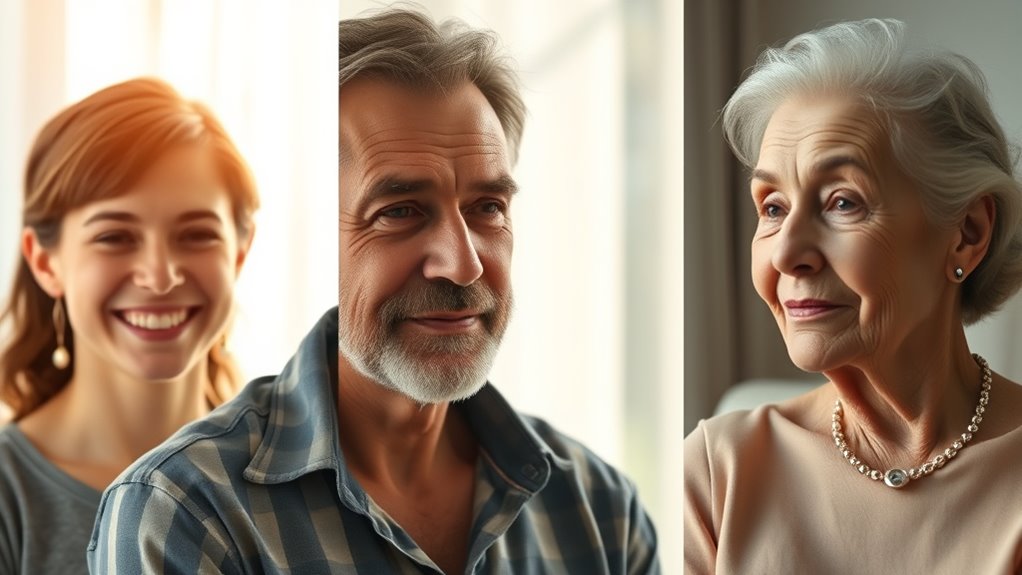
Middle age often brings noticeable shifts in sexual desire, influenced by hormonal changes, lifestyle factors, and relationship dynamics. As testosterone and estrogen levels fluctuate, you may notice your libido becoming less predictable or intense. Stress from work, health concerns, and busy schedules can also dampen your interest in sex. Additionally, changes in your relationship, such as long-term familiarity or emotional shifts, might influence your desire. You might find yourself seeking intimacy differently or experiencing periods of reduced interest. However, these changes are natural and vary widely among individuals. Understanding that this phase involves adjustments rather than declines helps you manage expectations. Embracing open communication with your partner and focusing on emotional connection can help maintain a satisfying sex life during middle age. Recognizing the importance of hormonal health can also play a significant role in managing libido changes during this stage.
Libido in Senior Years and Aging Factors
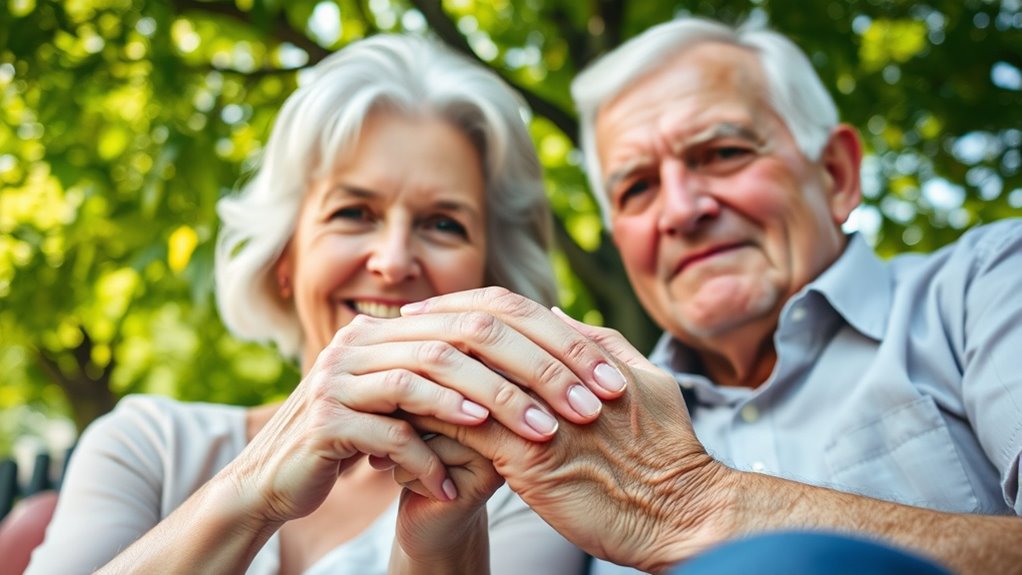
In senior years, natural aging processes considerably influence libido, often leading to noticeable changes in sexual desire. As you age, hormone levels like testosterone and estrogen decline, reducing your sex drive. Physical health issues such as cardiovascular problems, arthritis, or diabetes can also impact your interest in sex and your ability to be physically active. Medications prescribed for chronic conditions may further decrease libido or cause side effects that interfere with sexual activity. Additionally, psychological factors like stress, depression, or anxiety tend to become more common with age, affecting your desire. Fatigue and changes in body image can also play a role. Recognizing these factors helps you understand that shifts in libido are normal parts of aging, influenced by both physical and emotional health. Understanding permanent vs. temporary hearing loss can also be relevant, as hearing health can affect social interactions and emotional well-being, which in turn may influence libido.
Strategies for Maintaining a Healthy Libido at Any Age

Maintaining a healthy libido at any age involves adopting practical lifestyle habits and open communication. Regular exercise boosts blood flow and mood, directly enhancing desire. A balanced diet rich in nutrients supports hormone production. Managing stress through mindfulness or hobbies prevents libido decline. Openly discussing needs and concerns with your partner fosters intimacy and understanding. Avoid excessive alcohol and smoking, as these can impair sexual function. Prioritize sleep, since fatigue diminishes desire. Consider consulting a healthcare professional if issues persist. Incorporating a Personality Exploration approach can also help identify underlying factors affecting libido and relationships.
Frequently Asked Questions
How Do Hormonal Therapies Affect Libido Across Different Ages?
Hormonal therapies can considerably impact your libido by balancing hormone levels. In younger people, they may boost low libido caused by hormonal imbalances, while in older adults, they can help counteract declines due to aging. However, the effects vary depending on individual health, dosage, and type of therapy. You should discuss potential benefits and risks with your doctor to guarantee the treatment aligns with your specific needs and life stage.
Can Psychological Factors Override Biological Changes in Libido?
You might wonder if your mind can truly override your body’s biological signals. The answer is yes—psychological factors like stress, desire, and emotional connection can markedly influence your libido, sometimes even more than hormones. While biological changes set the stage, your mindset and feelings can ignite or extinguish desire. So, don’t underestimate the power of mental and emotional health—they can shape your libido in profound ways.
What Role Does Diet Play in Maintaining Sexual Desire?
Your diet plays a significant role in maintaining sexual desire. Eating nutrient-rich foods like fruits, vegetables, lean proteins, and healthy fats boosts blood flow and hormone production, which are essential for a healthy libido. Avoiding excessive alcohol, processed foods, and sugars can prevent energy dips and hormonal imbalances. By making mindful dietary choices, you support your body’s natural desire and keep your sexual health vibrant and balanced.
How Do Cultural Attitudes Influence Libido at Various Life Stages?
Cultural attitudes shape how you view and experience your libido at different life stages. If your culture values sexuality openly, you’re more likely to feel comfortable exploring and expressing desire. Conversely, cultures that stigmatize sexuality may suppress your libido or make you feel guilty about it. These attitudes influence your confidence, comfort, and motivations regarding sexual activity, ultimately affecting your libido across various phases of life.
Are There Specific Exercises That Boost Libido Naturally?
You can boost your libido naturally with specific exercises like Kegel exercises, which strengthen pelvic muscles and improve blood flow, enhancing arousal. Cardio workouts, such as brisk walking or swimming, increase overall stamina and hormone production. Yoga helps reduce stress and balance hormones, supporting desire. Incorporate these activities regularly, stay active, and maintain a healthy lifestyle to naturally enhance your libido and overall well-being.
Conclusion
No matter your age, your libido evolves—sometimes fading, sometimes reigniting. You might face quiet mornings of desire or lively nights of passion, each phase bringing its own rhythm. Embrace these changes, understanding they’re part of life’s natural flow. With awareness and care, you can nurture your desire across every stage. Because whether young or old, your libido’s journey is uniquely yours—ever shifting, yet always worth exploring.
